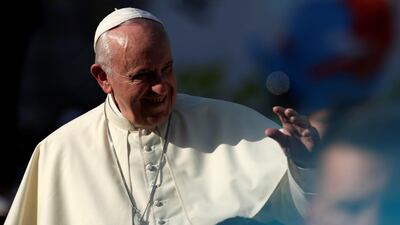Roman Catholics from around the Gulf will flock to the UAE for Pope Francis’s historic Mass in Abu Dhabi.
But before his visit, the first by the head of the Roman Catholic Church to the Arabian Gulf, some faithful in the region have expressed concern over travel arrangements and expenses.
About two million Catholics live in the Gulf region, many of whom are migrant workers from India and the Philippines.
About 1.5 million live in Saudi Arabia, where they are allowed to practise their religion but not attend church because there are none.
The papal visit is part of a larger push by the UAE and the GCC to promote interfaith dialogue and open doors to adherents of religions other than Islam.
Recent reports have suggested that Saudi Arabia could soon license churches as part of reforms by Crown Prince Mohammed bin Salman to become more progressive.
The Apostolic Vicariate of Southern Arabia, a network of Catholic churches in the GCC, is in charge of allocating only 2,000 available tickets to Catholic parishes across the region.
Sameetha, an Indian national living in Oman, said his church had to make last-minute travel arrangements for the dozens of parishioners interested in attending the Mass.
Other Catholics told The National that even if they belonged to a parish that had tickets, the cost of travel was prohibitive.
Some complained that visa requirements prevented them from attending the visit. Many foreign residents in the GCC must have a sponsor, usually their employer.
Those within six months of their resident visa expiring feared they would face difficulty in obtaining a tourist visa to visit another GCC country.
“I was not able to go because my visa was up for renewal at the end of March and we were afraid that I would be denied a visa because of that,” one Filipino Catholic said.
The National spoke to several Catholics who expressed similar concerns but were reluctant to go on record.
But most Catholics in the region said they were excited at the prospect of a region-wide congregation in Abu Dhabi and the symbolic demonstration of religious tolerance that the visit represented.
“We expect more guests coming from different regions to join and listen to the word of Pope Francis and we pray for the success of the international interfaith meeting of human fraternity,” said Lorie Parajillo, a Filipino Catholic living in Kuwait.
“It is an important step in the dialogue between Muslims and Christians and contributing to mutual understanding and peacemaking in the region.”
During his visit, the Pope will attend an interfaith meeting with Sheikh Ahmed Al Tayyeb, the Grand Mufti of the Sunni seat of learning, Al Azhar in Egypt.
Organisers say the logistics of such a visit are formidable.
“As we near Pope Francis’s visit to the UAE we see a reality taking shape every day and we hope and pray that all goes well and his visit will be a blessing to all,” said Father Michael O’Sullivan, a co-ordinator for the event.
Hundreds of free buses will be provided by the Abu Dhabi government for those attending the Mass and authorities have prepared for a major security and logistics operation.
Tickets have been provided for those coming from other Gulf countries.
Although no visa support has been given, organisers are working alongside GCC churches to ease travel arrangements for the thousands expected.
“These tickets are delivered to the churches based on a quota system on the size of the church, which will then be distributed to parishioners,” Fr O’Sullivan said.
While Kuwait and Bahrain have few Christian citizens, none have have registered to attend the visit.
“All the Catholics coming in from the GCC countries are expatriates, which is the make-up of our churches in the region, the majority of whom are Filipinos and Indians,” Fr O’Sullivan said.
More than 135,000 people are expected to attend the mass in Zayed Sports City next Tuesday.

